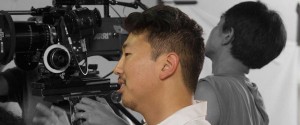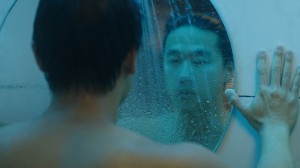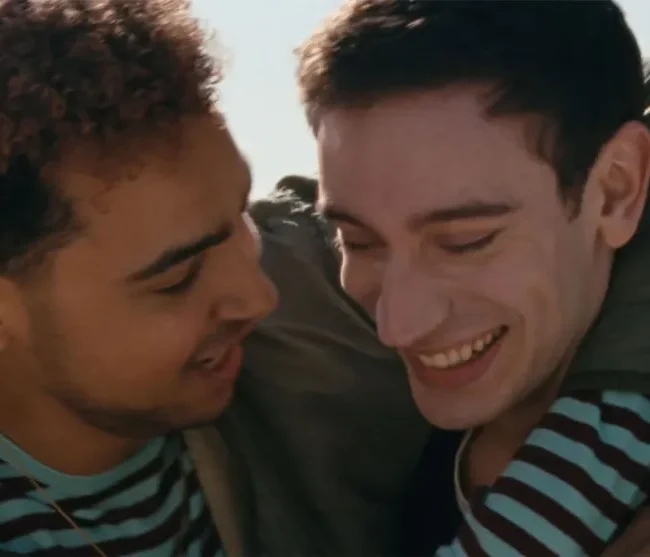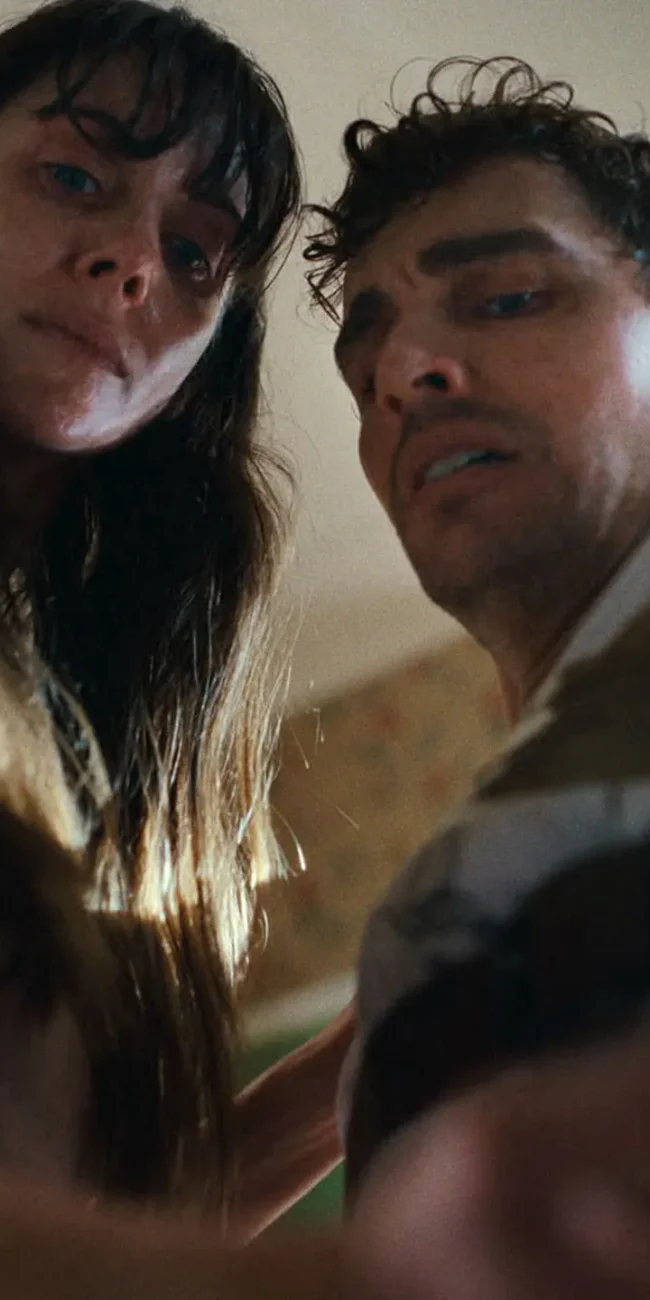A Conversation with Andrew Ahn (SPA NIGHT)
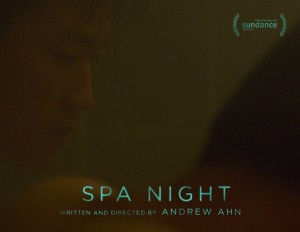 (Spa Night opens today at the Metrograph in NYC, and on August 26 at the Sundance Sunset in West Hollywood, with a VOD/DVD/Blu-ray release planned for later this year. Go here to find out more.)
(Spa Night opens today at the Metrograph in NYC, and on August 26 at the Sundance Sunset in West Hollywood, with a VOD/DVD/Blu-ray release planned for later this year. Go here to find out more.)
Writer/director Andrew Ahn first came to public attention when his short film Dol (First Birthday) screened at the Sundance Film Festival in 2012. Dol probes the inner conflicts of a young Korean American man who attends his nephew’s doljanchi, or Korean first-birthday celebration, while concealing his homosexuality from his immigrant parents. Subtly crafted and quietly heartbreaking, Dol is also noteworthy for its backstory: Ahn made the short partly as a way to come out to his own parents, who acted in the film but had no idea what its true subject was until he screened the finished work for them. (The film can be viewed here.)
Following Dol’s festival run, Ahn took part in the Sundance Screenwriters Lab and the Film Independent Screenwriting and Directing Labs, developing what would become his first feature. Spa Night premiered at Sundance 2016, and Ahn’s lead actor Joe Seo took home a Special Jury Award for Breakthrough Performance. Seo plays David, a Los Angeles teenager who lands a job as an attendant at a Koreatown spa after his parents’ restaurant closes down. First- and second-generation Korean Americans go to these spas to relax, soak, and scrub among (mostly) their own kind. But when Joe learns that some men are using the spa for gay hookups, it becomes a space of discovery and transgression as well, where his budding desires might reach full bloom.
Spa Night is exactly the feature one would hope for from the maker of Dol (First Birthday). It covers similar subject matter and thematic terrain as its predecessor, but with greater narrative complexity, a richer cinematic palette, and a more nuanced exploration of character — here, the immigrant parents (played by Haerry Kim and Youn-ho Cho) are treated with as much sympathy and tenderness as their American-born son. Ahn expertly maintains the film’s understated style and unhurried pacing while showing the characters’ longings, fears, and frustrations churning just below the surface.
After Sundance, Spa Night went on to screen at Jeonju, BAMcinemaFest, Sydney, Seattle, Outfest Los Angeles, and several other festivals. I spoke with Ahn a few days after its screening at the Asian American International Film Festival in NYC, as he was preparing for the film’s August 19 theatrical release.
Hammer to Nail: Spa Night seemed like such a natural outgrowth of Dol in so many ways. Can you talk about the artistic evolution from short to feature?
Andrew Ahn: It was a surprising jump. I always knew it was going to be exponentially more work to make a feature, but there were certain things that I had no idea were going to be a challenge. Even how you conceptualize and visualize scenes. In a short film you have so little time that you have to explain as much as possible very quickly. But in a feature you can let things breathe, and pace things out. It’s very musical, you’re building these phrases. That patience was hard to learn.
HtN: One similarity I found in the short and the feature is the internal quality of the protagonists. Both of them are wrestling with things they can’t express out loud. These things are felt very internally but you as the filmmaker have to find a way to express them externally.
AA: Especially with a feature — you can do it in short films too — but for the audience, watching a movie is a little bit like you’re a detective and you’re looking for these clues, and once you kind of crack open the case, you understand all the clues and how they were leading you up to that. With Spa Night, it’s fascinating: if I didn’t have that moment [toward the end] where David finally gets to express some emotion, all the rest of the film would feel bizarre and unemotional.
But I always knew that I wanted to reserve these moments of expression for when we really need it. Because David’s character is so withdrawn that really, so much of the heart of the movie is the parents — the parents are much more emotive throughout. In some ways we feel a little alienated from David in that we don’t exactly know how he’s feeling. But at the same time I think that as an audience, we side with him, because we’re observers in the same way that he’s an observer in that world.
It was a very risky strategy and it did scare me and I did have people say from the script stage [that] he’s a very passive character. But I felt like there was enough throughout the film that gave you a sense of his intentions and what he wanted. I mean, he goes out there and gets the job [at the spa], he has a little pushback moment with the SAT academy director, he gets a little drunk and has a little bit of a crush and maybe goes a little too far with the kids from USC — you know, there are these things that we get to see him do, it’s just that he’s quiet about it.
HtN: And without giving anything away for people who haven’t seen the film, you do have this sort of quiet rebellion towards the end where things build up to a real emotional payoff, even though it’s not the large conventional dramatic arc.
AA: Yeah, it just didn’t feel appropriate to the character and to the situation if the film ended in this particularly grand way. It had to be authentic, it had to be consistent, and so for me the challenge with the ending was to have the emotions feel big, to have the small realization feel really expansive. We really wrestled with it — it had to be grounded in the rest of the movie.
HtN: You’ve been working with your DP for a while. How did you two come up with a visual language for the film?
AA: Ki Jin Kim and I have been working on films together since like 2010, and we have a really wonderful relationship and a great shared vocabulary. We watch a lot of the same films, [although] he’s much more well-watched than I am. We went to CalArts together. So there’s references that we can go back to. For Spa Night, we talked a lot about observation and wanting to experience this film as if we were David, as if we were a character in the spa. For Ki Jin, that meant always putting the camera in a place that [a real person could actually] exist. So we very quickly ruled out things like cranes and drones, because it’s not like you fly through Koreatown. You walk in Koreatown.
The other thing we talked a lot about was this idea of visual yearning, to put in this sense of desire and want, to mirror David’s emotional state in how the film looks. Oblique angles, shooting through steam, framing things so that they’re just out of frame, a lot of backlighting, so you kind of have to look closer into the shadows. That was the overarching idea. And then we decided to lock down the camera, to put it on a tripod throughout the entire film, because we felt that stillness was necessary in order to really catch the minutiae of Joe’s performance — that in order to connect with this character, we have to sit with him and watch him, and we couldn’t give the audience a waiver to be distracted.
HtN: In film theory, there’s this idea of the male gaze, the notion that there’s a cinematic way of looking that’s usually associated with female bodies being objectified by the male [filmmaker and] viewer. But here you’re flipping it, it’s a man gazing at other men’s bodies with longing.
AA: I’ve actually had people say that this film feels like it has a female gaze, and I don’t deny that, but for me it’s just a gay gaze, a queer one. I think some of this is my philosophy on sex and what is erotic. Sexual attraction can often dehumanize a person. It’s almost like if the person is too human, they’re too intimidating to have sex with. There’s got to be this distance. And that’s what the spa offers David, this opportunity to objectify men, to watch them as a part of this space and not necessarily as human beings who have jobs and families out in the greater world. So the spa is kind of a fantasy and David slowly starts to explore [his] sexuality that way. But then it’s very clear by the end that he also wants a little bit more, that he wants some kind of connection, and I think that’s a really hopeful sign: he’s starting to think about his sexuality not just as a desire but as an identity.
HtN: The film is very erotic, but it’s not all that explicit.
AA: What we decided very early on was that when the spa was a cultural space, when it was just about men going to the spa to clean themselves and be a part of the Korean culture, you would actually see quite a lot, the nudity would be very explicit. But then when the space became more erotic, you would see less and less, and we would get closer and tighter, and that for me was [about] trying to make the sexual experiences more subjective, very much from David’s point of view.
And the other thing too is that explicit sex is really hard to show on film. It can throw you out of the narrative, and I always knew that this narrative is particularly delicate. I couldn’t give the audience the opportunity to bail on it. I watched Blue Is the Warmest Color and Stranger By The Lake while I was developing Spa Night. Both of those films have very explicit sex scenes, and both viewing experiences, for me, I had this moment where you snap out of the narrative and you kind of laugh at it! And I think they intentionally do that, I think that’s part of what those filmmakers wanted. It’s not what I wanted with Spa Night.
HtN: I don’t think I’ve ever seen a film that’s loaded with so many different aspects of Korean American experience, whether it’s the food, or the cultural rituals, or some of the family issues that come up. That really struck me the whole time I was watching it — but also, those things now feel imprinted with this very gay story. Which is kind of a radical move.
AA: So much of what I’d been thinking about is that my two identities, gay and Korean American, are very mutually exclusive. And I’ve separated them. Especially because my sense of Korean culture is very tied up with family, and in that way it’s very heteronormative. So, like, if I don’t marry a Korean woman and have a Korean baby where we do a doljanchi for this baby, am I still Korean? And what I’m trying to do with Dol (First Birthday) and with Spa Night is kind of force this queer perspective on these Korean traditions so that I can create an authentically queer Korean American culture: a new tradition, new ritual, new history, where these two identities aren’t separate but actually live together, intertwined.
You know, there’s a gay Asian [club night] here in Los Angeles called Game Boi, and it’s Game Boi with an “i” at the end. [HtN laughs] I know, it’s terrible! It’s every Friday, and there’s something about that I think is actually so significant. Because it’s creating a real Asian American culture that is also explicitly and undeniably gay. It’s making Asian American culture less heteronormative, and I think that’s huge. So with Spa Night‚ yes, it’s not “just” a gay story, but the gay story is what deepens the film, gives the film more meaning, and complicates the drama for the character.
HtN: Can you talk about shooting in Koreatown and getting the various locations? You had the spa, the restaurants, the church…Did people know what the story was when you were shooting?
AA: It was tricky. We were very careful. We explained when they asked questions. And if they didn’t ask questions — which is many places, actually, because if you just say that you’re a film and you’re going to pay them…
HtN: Right.
AA: …it’s a business transaction. And ultimately, we really felt that this film wasn’t an exploitation of the Korean American community. We were never portraying them in a negative light. It was complicated, and there was a little bit of nervousness, going out to the locations. Fortunately, here in Koreatown at least there’s a lot of everything. There are a lot of spas, there’s a lot of churches, there’s a ton of restaurants. So we had quantity on our side.
HtN: What was the reaction like at Jeonju?
AA: Jeonju was great. I think at any festival — whether it’s a gay festival, an Asian American festival, or a city-specific festival — festival-goers are always pretty excited to go see the movies that they buy tickets for. So I didn’t get any backlash. It’s not like there were any religious Korean people picketing my film. It was very supportive, a very well-received set of screenings. There were a lot of queer Korean kids, often very young, in their twenties — some came from Seoul two hours away to see the movie, which was awesome. A lot of the questions that I received at Jeonju were less about, you know, coming of age or finding yourself. They had more questions about the immigrant experience and what it was like to be in a different country and have a different language and different ideas of success. It was a fun experience.
H2N: Have you looked into Korean distribution for the film yet?
AA: We’ve been looking. You know, distributing [American] independent films in Korea is tricky because a lot of the international films that get distributed are much bigger movies, like Hollywood blockbusters. We have been in talks with a few places. Obviously it would be very meaningful to me if we could screen there. But I get that it’s not gonna be a huge movie in Korea.
H2N: So Strand is releasing the film August 19th — how’s that process been going so far?
AA: It’s been going well. Distribution, it’s a little bit scary, you just have no idea if people are going to come out. But we’ve been lining up some press, and we’re releasing our trailer and our poster. We’re using our festival screenings as a way to promote the theatrical — a film like Spa Night, so much of its success depends on word of mouth, so we’re just trying to empower people who’ve seen it to talk about it. I think in many ways we’re in a really advantageous time because of #OscarsSoWhite and the whole “whitewashing” debacle with Ghost in the Shell and Doctor Strange — you know, people are asking for Asian American stories, and it’s like, Oh, I got one! [laughs] So I’m hoping that it works in our favor.
H2N: What do you have in mind to do next?
AA: I realized after Spa Night, taking a few meetings and talking to people, that you kind of have to have a few projects that you’re juggling. Because people are curious about not just what your next feature is, but what’s the TV project that you’re interested in, what’s the big feature that might be three films down the road. You never know what some producer or financier is going to respond to. So I’ve been working on a few projects that are based off of articles, looking for true-to-life stories that have some connection to me, whether it’s because it’s a queer story or because it’s Asian American. There’s a book that I’m very keen on adapting that I’m not gonna talk about because I’m this close to getting it, and I’m getting a little paranoid about it. But it would be a really cool book to do. And then figuring out some TV stuff: TV ideas set in Los Angeles, about the diversity of Los Angeles. Some things are gay, some things are Korean, some are both, some are neither, and I’m just kind of waiting for someone to pay me!
— Nelson Kim







